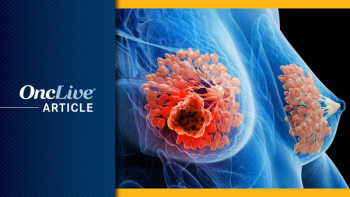
Future Research Efforts for ALK-Driven Lung Cancer
Transcript:
Mohammad Jahanzeb, MD: Regarding my final thoughts, I think it’s extremely important that all of us, as a medical oncology community, biopsy every patient and test every patient. Right now, the penetrance of testing is still around 60%, which is woefully low. You would not see that in breast cancer. You would not imagine treating a patient with breast cancer without knowing whether they are estrogen-receptor, progesterone-receptor, or HER2-positive or HER2-negative. So, we should approach lung cancer the same way. Unless we know that the patient’s a heavy smoker with squamous cell and there are no clinical trials available, etc, we should be testing patients, using the next-generation sequencing, obtaining adequate tissue, and educating our interventional radiologists to do so. We should educate our pathologists to not waste tissue on frivolous immunohistochemical tests, and just send the remaining tissue for next-generation sequencing.
And then, on the other hand, we should keep patient anxiety down and tell them, “Just because you found out that you have metastatic lung cancer that does not make it a medical emergency. It’s an emotional emergency. This was growing in your body for months to years, and you can easily wait the 3 weeks that it takes to find the right treatment and match it to you, rather than just start with chemotherapy next week.”
I usually say to my patients, “I can do the wrong thing next week, or the right thing in 3 weeks. Which do you want me to do?” And most of them believe that argument and wait 3 weeks. Only 1 out of 10 patients has such heavy tumor burden, such a tempo of disease, that you know you have to start something right away. The vast majority of patients can wait 3 weeks to find out what they have.
Shirish Gadgeel, MD: I think that we may be moving into an era where we profile the tumors more thoroughly. At the present time, we are testing patients for a single gene alteration such as EGFR, ALK, or KRAS. But we generally tend to stop at that point and then treat the patients based on what specific mutation is identified. I think it is quite possible that, in the future, we may do a more detailed molecular analysis and determine not only the primary driver or genetic alteration, but also the other genetic alterations that may be contributing to the biology of the tumor.
So, there are data sets to show that certain tumors have activation of the MEK pathway or the STAT pathway. If such other pathways are identified in ALK-positive tumors, targeting those pathways in addition to giving an ALK inhibitor may truly provide more sustained and prolonged benefit to these patients. The combinations discussed do appear to be promising, but my suspicion is that in the future, we’ll be doing a more detailed molecular profile of the tumor and, based on that, defining the appropriate combination for the patient.
The research in ALK-positive non—small cell lung cancer, I believe, is headed in 2 primary areas. One is to try to define the proper sequence of ALK inhibitors. The NCI is attempting to launch what is called the ALK-MATCH study, which is going to try and profile molecularly tumors before starting any ALK inhibitor and then treat with different ALK inhibitors. At the time of progression, it will again profile the tumors and, based on that profile, determine what the next treatment should be. This will not be an easy effort. It will be very challenging, but the hope is that such an effort will define what the right sequence is for a particular patient. The hope is that, by choosing the right sequence, patients will derive more sustained and long-term benefit.
The other area of research, I believe, is trying to define what the other combination drug that should be utilized is. As it is seen in any part of medicine, generally, these diseases are not treated with single drugs. You do need combination treatments. Right now, the combinations that are being tested are somewhat speculative. I think it would be better to be more scientifically rigorous, defining the specific features of each tumor, and based on that, defining the proper combination treatment for that particular patient. So, I feel the primary area of research is deciding the right sequence to be administered to a particular patient, understand the patient’s tumor, and, based on that, deciding the right combination for a particular ALK patient.
Transcript Edited for Clarity




































